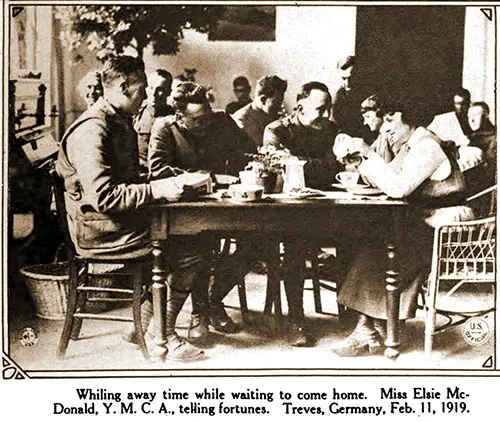The Signal Corps in Germany’s Oldest City - 1919

Whiling Away Time While Waiting to Come Home. Miss Elsie McDonald, YMCA, Telling Fortunes. Treves, Germany, 11 February 1919. United States Official Pictures of the World War, 1920. GGA Image ID # 19bb1a071a
TREVES, GERMANY. —There is an American home for American telephone operators in the Treves district, right in the center of the oldest city in Germany.
Miss Marjorie Persons, Y. W. C. A. representative, is director of the house. The YWCA is officially in charge of the billeting of the Signal Corps units with the A. E. F.
Their house is a luxurious big home, the property of wealthy Germans. It is set in a garden whose shrubs are beginning to leaf. A high stone wall shuts it off from the city and gives privacy to the garden walks.
Inside, the rooms are filled with beautiful furniture. There is a wide, open fireplace in the sitting room, with family portraits above it. The dining room is lined with heavy carved paneling, and there is fine linen and silver service. On the piano is a picture of the family group—father, mother, daughters and one tall boy. The boy is now dead, killed in the early days of the war.
The family is interned in Switzerland. The house was requisitioned from the German Government for the Army of Occupation.
Little street cars with shiny windows bob across the cobbles near the house. They have still their placards of war days. One, given most prominence, reads: “
(1) Save your leather shoes for winter.
(2) Don’t be reluctant to wear wooden shoes or wooden soles.
(3) During summer and fall go barefooted or wear sandals.
(4) Wear your poorest shoes during dry weather.
(5) Keep on using your shoes. Have them half-soled.
(6) Wear slippers in the house.”
The Signal Corps House is not far from the Black Gate or Porta Nigra, the unfinished gate of the city built by the Romans. The city is full of Roman ruins dating back to the time of the emperors of Rome. The American doughboys who go under the gate daily, call it the “[Black] Porter.”
And in this setting, built by the Ages in their march through Time, is the little family of American Signal Corps girls.
War Work Bulletin, New York: Young Women’s Christian Associations No. 68. 16 May 1919
Telephone Girls Housed in Beautiful German Home
The members of the Signal Corps unit of American telephone operators for the Treves district—one of the oldest cities in Germany—are billeted in a luxurious and spacious home, the property of wealthy Germans. A high stone wall shuts it off from the city and gives privacy to the garden walks.
Inside the rooms are filled with beautiful furniture. There is a wide, open fireplace in the sitting-room with beautifully done family portraits above it. The curio cabinet is filled with rare bits of the world's art. The dining-room is lined with heavy carved paneling and there is fine linen and silver service.
On the piano is a picture of the family group—father, mother, daughters and one tall boy. The boy is now dead, killed in the early days of the war. On a table there is another picture of him as he went away to the fight in his officer’s regalia of the German army. The country to whom they gave their only son has lost the war and they have lost also their home.
The family is interned in Switzerland. The house was requisitioned by the American army and stands just as they left it, with the intimate personal things about the rooms. As is being done in the case of all requisitioned property used by the army of occupation, the German government will be forced to adequately and justly recompense the owners for its use, but the A. E. F. pays nothing.
There were a couple of maids who came with the house, as happens in so many similar cases. They had been retained by the family on half pay during their stay in Switzerland and the Americans took them over with the rest of the place. At first they were frightened. Like all Germans, they were not sure what to expect at the hands of their ‘'conquerors,” but they soon lost their fear. They now serve the American women cheerfully, watching their fires carefully and serving American commissary food in their best Teuton style.
"Telephone Girls Housed in Beautiful German Home," in Telephony: The American Telephone Journal, Chicago: The Telephony Publishing Company, Vol. 76, No. 22, Saturday, 31 May 1919, p. 29.
